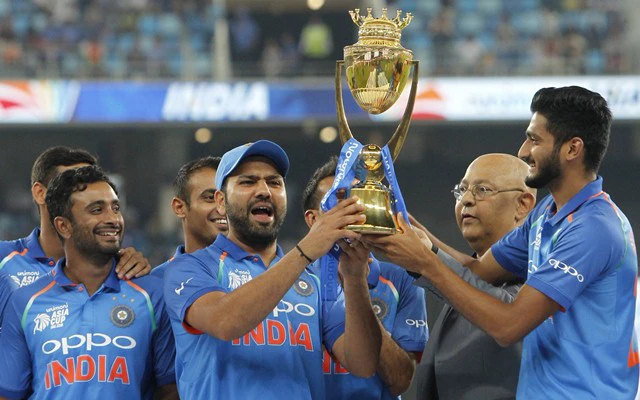Over the years, the Asia Cup has produced many memorable campaigns and iconic moments. Each edition has shown the amount of talent across the Asian continent, making it one of the most looked-forward-to events in the cricketing calendar, usually held once in every two years, with the first edition played in 1984.
The upcoming Asia Cup 2025, set to begin on September 9 in the United Arab Emirates. For the first time in history, the competition will feature eight teams in the T20 format, serving as perfect preparation ahead of the 2026 T20 World Cup. The line-up includes India, Pakistan, Sri Lanka, Bangladesh, Afghanistan, Hong Kong, Oman, and the host UAE.
Here are the five best Asia Cups in history:
5. Asia Cup 2018:
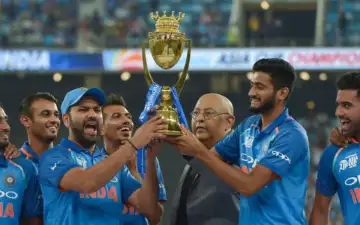 The 2018 Asia Cup, hosted in the UAE from September 15 to 28, was a tournament that saw India come out as champions for the seventh time. With Virat Kohli rested, Rohit Sharma wore the captaincy hat, guiding the team through a tough campaign. India began with a 26-run win over Hong Kong before convincingly defeating arch-rivals Pakistan twice, by eight and nine wickets, respectively. In the Super Four stage, they also defeated Bangladesh comfortably and played out a memorable tie against Afghanistan.
The 2018 Asia Cup, hosted in the UAE from September 15 to 28, was a tournament that saw India come out as champions for the seventh time. With Virat Kohli rested, Rohit Sharma wore the captaincy hat, guiding the team through a tough campaign. India began with a 26-run win over Hong Kong before convincingly defeating arch-rivals Pakistan twice, by eight and nine wickets, respectively. In the Super Four stage, they also defeated Bangladesh comfortably and played out a memorable tie against Afghanistan.
The final against Bangladesh at the Dubai International Stadium went down to the wire. Litton Das’ brilliant 121 took Bangladesh to 222, but India’s bowlers, including Kuldeep Yadav (3/45), triggered a collapse. Chasing 223, the Men in Blue’s innings had its share of struggles. Rohit anchored with a 48, while contributions from MS Dhoni and Dinesh Karthik kept the team in the hunt. A hamstring-injured Kedar Jadhav returned late in the chase to partner Kuldeep, eventually sealing a narrow three-wicket win off the very last ball. Notably, this was Rohit’s first title as an Indian skipper.
4. Asia Cup 2012:
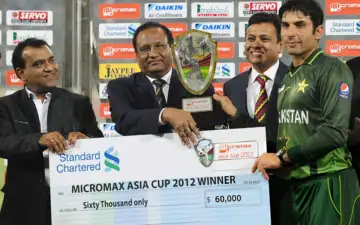 The 2012 Asia Cup, played in Bangladesh, is one of the most memorable editions in the tournament’s history. The Misbah-ul-Haq-led Pakistan won the season, but their campaign was far from smooth. They began with a 21-run win against Bangladesh and followed it up with a six-wicket victory over Sri Lanka. However, they suffered a heavy defeat to India, where a young Virat Kohli produced his highest ODI score of 183, helping the Indians to an impressive chase of 330.
The 2012 Asia Cup, played in Bangladesh, is one of the most memorable editions in the tournament’s history. The Misbah-ul-Haq-led Pakistan won the season, but their campaign was far from smooth. They began with a 21-run win against Bangladesh and followed it up with a six-wicket victory over Sri Lanka. However, they suffered a heavy defeat to India, where a young Virat Kohli produced his highest ODI score of 183, helping the Indians to an impressive chase of 330.
Despite that setback, Pakistan regrouped and reached the final against the hosts. The summit clash turned out to be one of the closest games. Batting first, Pakistan posted 236/9, with Sarfaraz Ahmed top-scoring with 46*. In reply, the hosts fought hard through Tamim Iqbal (60) and Shakib Al Hasan (68), but fell short by just two runs. Aizaz Cheema’s nerve-wracking final over sealed Pakistan’s second Asia Cup title. The tournament was also historic for Indian cricket. Sachin Tendulkar achieved his long-awaited 100th international century against Bangladesh at Dhaka’s Shere Bangla National Cricket Stadium.
3. Asia Cup 2010:
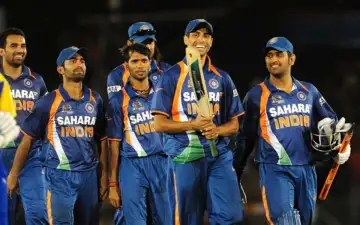 The 2010 Asia Cup in Sri Lanka turned out to be a special one for Indian cricket as MS Dhoni’s team lifted the title after 15 long years. The Men in Blue began their campaign with a comfortable six-wicket win over Bangladesh, followed by a thrilling clash against arch-rivals Pakistan. Chasing 267, the match went right down to the wire before Harbhajan Singh smashed a famous last-over six off Mohammad Amir to seal victory by three wickets in Dambulla.
The 2010 Asia Cup in Sri Lanka turned out to be a special one for Indian cricket as MS Dhoni’s team lifted the title after 15 long years. The Men in Blue began their campaign with a comfortable six-wicket win over Bangladesh, followed by a thrilling clash against arch-rivals Pakistan. Chasing 267, the match went right down to the wire before Harbhajan Singh smashed a famous last-over six off Mohammad Amir to seal victory by three wickets in Dambulla.
The heated exchange between Harbhajan and Shoaib Akhtar in the same contest made it one of the most talked-about games of the tournament. India’s sole defeat came against Sri Lanka in the group stage, where they lost by seven wickets. However, in the final against the host nation, the team batted first. India posted 268, thanks to an innings from Dinesh Karthik, who stepped up in the absence of senior players like Sachin Tendulkar, Virender Sehwag, and Yuvraj Singh. The Indian bowlers then ran through the Lankan top order, putting them to 51 for 5, before sealing an 81-run win.
2. Asia Cup 2014:
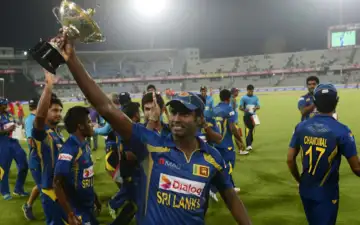 The 2014 edition of the Asia Cup witnessed Sri Lanka emerge as champions. From the very first game, where they got past Pakistan by 12 runs, Sri Lanka remained consistent throughout the tournament. They followed it up with a two-wicket win against India, a 129-run victory over Afghanistan, and a three-wicket triumph against hosts Bangladesh. Undefeated in the group stage, Sri Lanka looked the most balanced side, with contributions coming from both bat and ball.
The 2014 edition of the Asia Cup witnessed Sri Lanka emerge as champions. From the very first game, where they got past Pakistan by 12 runs, Sri Lanka remained consistent throughout the tournament. They followed it up with a two-wicket win against India, a 129-run victory over Afghanistan, and a three-wicket triumph against hosts Bangladesh. Undefeated in the group stage, Sri Lanka looked the most balanced side, with contributions coming from both bat and ball.
Meanwhile, the tournament had its share of memorable moments. Bangladesh nearly pulled off a shocker by scoring 326 against Pakistan, but Shahid Afridi’s explosive 59 off 25 balls sealed a narrow win for the Men in Green. The India-Pakistan clash also grabbed headlines, with Afridi once again finishing the game in style. However, Pakistan’s brilliance wasn’t enough in the final. The summit clash in Dhaka saw Sri Lanka face Pakistan once more and chase down 261 with five wickets in hand. With this win, Angelo Mathews’ team had an unbeaten campaign, lifting their fifth Asia Cup title.
1. Asia Cup 2016:
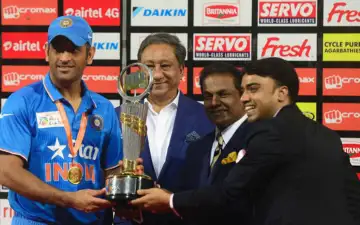 The 2016 season was a historic one as it was the first time the tournament was played in the T20I format, seen as a preparatory platform for the upcoming T20 World Cup that year. Hosted in Bangladesh, the competition saw India dominate right from the start under MS Dhoni’s captaincy. India began their campaign with an impressive 45-run win over the hosts. They went on to outclass Pakistan in a low-scoring contest, chasing down 84 after a top-order collapse, thanks to Virat Kohli’s 49. Wins against Sri Lanka and the UAE followed, making the Men in Blue the only unbeaten team in the group stage.
The 2016 season was a historic one as it was the first time the tournament was played in the T20I format, seen as a preparatory platform for the upcoming T20 World Cup that year. Hosted in Bangladesh, the competition saw India dominate right from the start under MS Dhoni’s captaincy. India began their campaign with an impressive 45-run win over the hosts. They went on to outclass Pakistan in a low-scoring contest, chasing down 84 after a top-order collapse, thanks to Virat Kohli’s 49. Wins against Sri Lanka and the UAE followed, making the Men in Blue the only unbeaten team in the group stage.
The final against Bangladesh was rain-affected and reduced to 15 overs per team. The hosts posted 120/5, with Sabbir Rahman and Mahmudullah playing handy knocks. The visitors’ reply began with Shikhar Dhawan (60) and Kohli (41*) stitching a solid stand before Dhoni sealed the deal with his sixes. India clinched the title with an eight-wicket win, finishing unbeaten. Virat Kohli (153 runs) and Rohit Sharma (138 runs) had impressive runs with the bat, while Hardik Pandya was India’s most successful bowler with seven wickets.
